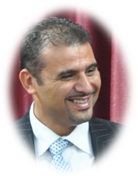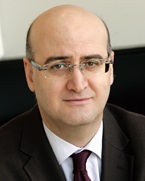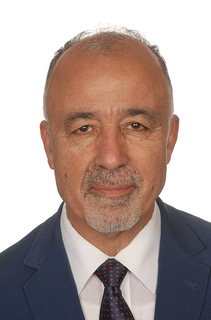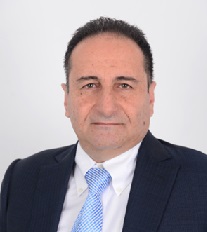- Home
- Objective
- Invited Speaker
- Keynote Speakers
- Partner Universities
- Modality & submission
Paper presentation and submission

The conference will consist of oral presentations of fifteen minutes with few plenary sessions. All submitted papers will be peer reviewed. Accepted papers will be published as a collective work in an electronic format and will be submitted for inclusion to IEEE Xplore

Digital Twin for Wellbeing
Abdulmotaleb El Saddik, FIEEE, FEIC, FCAE
Distinguished Professor and University Research Chair
University of Ottawa
Canada
www.eecs.uottawa.ca/~elsaddik
www.mcrlab.netA digital twin is a digital replication of a living or non-living physical entity. By bridging the physical and the virtual worlds, data is transmitted seamlessly allowing the virtual entity to exist simultaneously with the physical entity. A digital twin facilitates the means to monitor, understand, and optimize the functions of the physical entity and provides continuous feedback to improve quality of life and wellbeing. In this talk, we will discuss the convergence of multimedia technologies (AR/VR, AI, IoT, Wearables, BigMM Data and 5G-Tactile Internet) towards the digital twin for health care. We will conclude by describing the challenges and the open research questions.
Bio:
Abdulmotaleb El Saddik is Distinguished University Professor and University Research Chair in the School of Electrical Engineering and Computer Science at the University of Ottawa. He is the director of the Multimedia Communications research Laboratory and the Medical Devices Innovation Institute. His research focus is on the establishment of Digital Twins using AI, AR/VR and Tactile Internet that allow people to interact in real-time with one another as well as with their digital representation. He has authored and co-authored 10 books and more than 550 publications and chaired more than 50 conferences and workshop. He received 7 Best Paper Awards for peer-reviewed, published articles. He has obtained research grants and contracts totaling more than $18 M. He has supervised more than 120 researchers and received several international awards, among others, are ACM Distinguished Scientist, Fellow of the Engineering Institute of Canada, Fellow of the Canadian Academy of Engineers and Fellow of IEEE, IEEE I&M Technical Achievement Award, IEEE Canada C.C. Gotlieb (Computer) Medal and A.G.L. McNaughton Gold Medal for important contributions to the field of computer engineering and science.Professor Moncef Gabbouj
Director, NSF IUCRC Center for Visual and Decision Informatics, Finland-Site
Department of Computing Sciences
Tampere University
Tampere, Finland
Email: Moncef.gabbouj@tuni.fi
Title
Advanced machine learning for biomedical signal analyticsAbstract
In this talk, we shall discuss how we approach biomedical signal analytics from a signal processing, pattern recognition and machine learning point of view to solve pertinent problems in the field. We present a hierarchical layered approach that exploits different types of sensor and non-sensor signals and design suitable representation, processing and analysis algorithms in order to apply machine learning, including deep and shallow learning. We shall then exploit the layered approach in a wide array of applications, with specific emphasis on ECG classification, where we shall present a fast and accurate patient-specific electrocardiogram (ECG) classification and monitoring system. The proposed system uses an adaptive implementation of 1D Convolutional Neural Networks (CNNs) which is used to fuse the two major blocks of the ECG classification into a single learning body: feature extraction and classification. The proposed solution can be used for real-time ECG monitoring and early alert system on a light-weight wearable device.Dr. MONCEF GABBOUJ received his BS degree in electrical engineering in 1985 from Oklahoma State University, Stillwater, and his MS and PhD degrees in electrical engineering from Purdue University, West Lafayette, Indiana, in 1986 and 1989, respectively.
Dr. Gabbouj is a Professor of Signal Processing at the Department of Computing Sciences, Tampere University, Tampere, Finland. He was Academy of Finland Professor during 2011-2015. He was a visiting professor at the Departments of Electronic and Computer Engineering, Hong Kong University of Science and Technology, Hong Kong. Dr. Gabbouj was on sabbatical at the Viterbi School of Engineering, University of Southern California, Los Angeles, California, during spring 2012, and before that a visiting professor at the School of Electrical and Computer Engineering of Purdue University, West Lafayette, Indiana during fall 2011. He was also a visiting professor at the American University of Sharjah, UAE in 2007-2008. He was Head of the Department during 2002-2007. Dr. Gabbouj was Senior Research Fellow of the Academy of Finland during 2007-2008 and 1997-1998. He is the co-founder and past CEO of SuviSoft Oy Ltd. From 1995 to 1998 he was a Professor with the Department of Information Technology of Pori School of Technology and Economics. From 1994 to 1995 he was an Associate Professor with the Laboratory of Signal Processing of Tampere University of Technology, Tampere, Finland. From 1990 to 1993 he was a senior research scientist with the Research Institute for Information Technology, Tampere, Finland. Dr. Gabbouj is currently the TUT-Site Director of the NSF IUCRC funded Center for Visual and Decision Informatics and member of the Science Council of Tampere University of Technology. His research interests include Big Data analytics, multimedia content-based analysis, indexing and retrieval, artificial intelligence, machine learning, pattern recognition, nonlinear signal and image processing and analysis, voice conversion, and video processing and coding.
Dr. Gabbouj is an IEEE Fellow. He is a member of the IEEE Fourier Award Committee. He is member of the Academia Europaea and the Finnish Academy of Science and Letters. He served as Distinguished Lecturer for the IEEE Circuits and Systems Society in 2004-2005, and Past-Chairman of the IEEE-EURASIP NSIP (Nonlinear Signal and Image Processing) Board. He was chairman of the Algorithm Group of the EC COST 211quat. He served as associate editor of the IEEE Transactions on Image Processing, and was guest editor of Multimedia Tools and Applications, the European journal Applied Signal Processing. He is the past chairman of the IEEE Finland Section, the IEEE Circuits and Systems Society, Technical Committee on Digital Signal Processing, and the IEEE SP/CAS Finland Chapter. Dr. Gabbouj is the General Co-Chair of ICIP 2020. He was also Chairman of EUVIP 2014, CBMI 2005, WIAMIS 2001 and the TPC Chair of ISCCSP 2006 and 2004, CBMI 2003, EUSIPCO 2000, NORSIG 1996 and the DSP track chair of the 1996, 2012, 2013 and 2014 IEEE ISCAS. He is also member of EURASIP Advisory Board and past member of AdCom. He also served as Publication Chair and Publicity Chair of IEEE ICIP 2005 and IEEE ICASSP 2006, respectively. Dr. Gabbouj was Honorary Guest Professor of Jilin University, China (2005-2010).
Dr. Gabbouj was the Director of the International University Programs in Information Technology (1991-2007) and vice member of the Council of the Department of Information Technology at Tampere University of Technology. He was also the Vice-Director of the Academy of Finland Center of Excellence SPAG, Secretary of the International Advisory Board of Tampere International Center of Signal Processing, TICSP, and member of the Board of the Digital Media Institute. He served as Tutoring Professor for Nokia Mobile Phones Leading Science Program (2005-2007 and 1998-2001). He is a member of IEEE SP and CAS societies.
Dr. Gabbouj was the recipient of the 2017 Finnish Cultural Foundation for Art and Science Award, the 2015 TUT Foundation Grand Award, the 2012 Nokia Foundation Visiting Professor Award, the 2005 Nokia Foundation Recognition Award. He is the co-recipient of the Myril B. Reed Best Paper Award from the 32nd Midwest Symposium on Circuits and Systems and the NORSIG Best Paper Award from the 1994 Nordic Signal Processing Symposium. He was also the supervisor of the main author receiving the Best Student Paper Award from IEEE International Symposium on Multimedia, ISM 2011, the IBM Best Paper Award at ICPR 2014 and IPTA 2016. He published two books and over 700 journal and conference papers and supervised 47 doctoral and 58 Master theses.
Dr. Gabbouj has been involved in several past and current EU Research and education projects and programs, including Horizon, ESPRIT, HCM, IST, COST, Tempus and Erasmus. He also served as Evaluator of IST proposals, and Auditor of a number of ACTS and IST projects on multimedia security, augmented and virtual reality, image and video signal processing.

Professor Mohamad Sawan
Affiliation1) Westlake University, Hangzhou, China,2) Leave of absence from Polytechnique Montreal, Canada
Title: Epileptic Seizures: From Foci Localization to Deep Learning Prediction
Abstract:
Epilepsy is one of main neurological disorders. Less than 3% of patients only can benefit from surgery. Also, presurgical monitoring to localize the focus is a challenging step. Wearable and implantable brain-machine interfaces (BMIs) are introduced to face the localization of the seizure zone, its onset detection, and abortion of seizures before their emergence. On the other hand, on line prediction of seizures at least a half hour before its appearance is major challenges due to the complexity of brain behavior. This talk includes the description of a wearable helmet based on a fNIRS platform which is composed of an array of system-in-package based optodes proposed to measure hemoglobin variation in deep cortical levels. If a seizure is located but surgery cannot be accomplished, a multichannel mixed-signal detector and stimulator can be used to onset abort the seizures. Most important, prediction based on deep-learning algorithms is creating hope and significant expectation, that allow to prevent seizure while before its onset zone. Several research groups are conducting deep learning implementations to validate predicting algorithms using regular and intracortical EEGs to identify generators of seizure activity.
Bio:
Prof. Mohamad Sawan received the Ph.D. degree in electrical engineering from Université de Sherbrooke, Sherbrooke, QC, Canada, in 1990. He joined Polytechnique Montréal, Canada, in 1991, where he was a Professor of Microelectronics and Biomedical Engineering. He is Chair Professor in Westlake University, Hangzhou, China, in 2019, where he is founder and director of the Center for Biomedical Research And INnovation (CenBRAIN). Dr. Sawan was Deputy Editor-in Chief of the IEEE Transactions on Circuits and Systems-II: Express Briefs (2010-2013), Co-Founder, Associate Editor and Editor-in-Chief of the IEEE Transactions on Biomedical Circuits and Systems, Associate Editor of the IEEE Transactions on Biomedical Engineering, and the International Journal of Circuit Theory and Applications. He is founder of the International IEEE-NEWCAS Conference and of the Polystim Neurotech Laboratory, and Co-Founder of the International IEEE-BioCAS Conference, and the International IEEE-ICECS. General Chair of the 2016 IEEE International Symposium on Circuits and Systems (ISCAS), and General Chair of the 2020 IEEE International Medicine, Biology and Engineering Conference (EMBC). His scientific interests are the design and testing of analog and mixed-signal circuits and systems, signal processing, modeling, integration, assembly, and bio-validation. He was awarded the Canada Research Chair in Smart Medical Devices (2001-2015), and was leading ReSMiQ, the Microsystems Strategic Alliance of Quebec (1999-2018). Dr. Sawan published more than 800 peer reviewed papers, two books, 10 book chapters, and 12 patents. He received several awards, among them the Barbara Turnbull 2003 Award for spinal cord research, the Bombardier and Jacques-Rousseau Awards. Dr. Sawan is Fellow of the IEEE, Fellow of the Canadian Academy of Engineering, Fellow of the Engineering Institutes of Canada, and “Officer” of the National Order of Quebec.
 Professor Anwar El-Homsi
Professor Anwar El-HomsiAuthor, CEO of Jainus, President of PassCare USA
Title: Applying Artificial Intelligence In Healthcare
Abstract: Artificial Intelligence will disrupt healthcare the most out of any industry. In actuality it will totally redesign it, from surgical robots created to assist with medical procedures to service robots supporting hospital operations. Surgical robotics for example will improve the quality of life for patients through lower operation times, less bleeding, and less of a chance for infection.
AI-based applications would improve health outcomes and the quality of life for millions of people in the coming years. It is predicted that by 2025, Artificial Intelligence systems are expected to be implemented in 60% of the global hospitals and, in turn, deliver easily accessible, cheaper, and quality care to millions of patients.
There are many benefits to apply AI to healthcare: it will provide better diagnostics, improve patient care, reduce physician and hospital errors, reduce healthcare costs, and provide a personalized treatment. Artificial Intelligence will assist physicians with the decision-making process by analyzing patient’s past health records and available clinical data that is specifically aligned with the patient’s treatment plan.
This presentation covers Artificial Intelligence applications in Healthcare and discusses how it is being transformed from being reactive, episodic, and focused on disease into preventing sickness, from provider-centric into patient-centric with greater efficiency, better preventive care, and most importantly delivers an integrated and collaborative healthcare system.Bio:
Dr. El-Homsi has more than 25 years of global leadership of combined experience in Artificial Intelligence, Applied Statistics, Lean Six Sigma, and Design Thinking. He held Management positions at Verizon Communications Inc., Cisco Systems, and Space Systems Loral and was a consultant to Fortune 100, privately held companies, and non-profit organizations, including Bombardier and Bausch & Lomb. Dr. El-Homsi is currently the CEO of Jainus, an Artificial Intelligence Consulting Company, and President of PassCare USA.
Anwar has a PhD in Business Systems, M.S. in Applied Statistics, and B.S. in Engineering. He was a member of the Advisory Council for Rochester Institute of Technology’s Center for Quality and Applied Statistics. He is the originator of the CREŌ problem solving model and author of five business books including “Artificial Intelligence, A Leader’s Guide to Building the Future”.
- Invited Speaker









